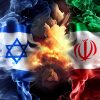In Part 1, I provided the history and background of Hamas and their Antisemitic hatred of Israel, culminating in its October 7th, 2023 invasion of Israel and massacre of some 1,400 Israeli citizens. Now we will look at the where’s, why’s, and solution to Hamas’ Antisemitic attack on the Jewish people.
Where
We often tell people that Israel is about the size of New Jersey. A better reference might be the Dallas-Fort Worth metroplex, both in size and in population. Compared even to Israel, Gaza is tiny—just over 17 square miles. (By comparison, Manhattan is almost 23 square miles.)
In terms of population, Gaza is home to just over 2 million Palestinians (Manhattan only has 1.6 million). The fact that the world attention is focused on Israel and Gaza is a fulfillment of Bible prophecy. Zechariah foresaw that the nations of the world would become fixated on the land around Jerusalem—
and that they would come against Jewish people regathered there (Zechariah 12:2-3; 14:14-16).
Today, billions of dollars in US military assets and thousands of American soldiers, sailors, airmen, and Marines are arrayed around Israel, offering demonstrable proof that Israel is once again at the center of the world’s attention. But the war raging in Gaza and threatening to escalate into a regional conflict is already causing skirmishes around the globe.
In every nation where Jews and Muslims have immigrated, protests and riots have ensued in recent weeks. What began as an initial outpouring of support for Israel and solidarity with the Jewish people quickly turned into Antisemitic outrage. And in places where sizeable Muslim populations are located, the rage of Hamas has been echoed in the frenzy of its unapologetic supporters and their fellow travelers.
Even here in America, security experts have warned that terrorist sleeper cells, Palestinian agitators, and radicalized individuals are poised to spark their own Intifada (violent uprising). Unlike past wars that largely took place “over there” in distant lands, the war on Jews and those who support the Jewish state will ensue wherever masses stoked to hate God’s chosen people live.
Regardless of the turmoil that lies ahead, we can be certain that the satanic effort to destroy Israel will fail. God promised to: “assemble the banished ones of Israel, and [gather] the scattered of Judah from the four corners of the earth” (Isaiah 11:12). And having regathered them, He promised,
“I will also plant them on their own land, and they will not again be rooted out from their land which I have given them” (Amos 9:15).
Despite Palestinian propaganda and lies, the Jewish people will continue to live and thrive in their land—the Land God gave them.
Why
In addition to God’s prophetic word regarding Ishmael and his descendants, there is another tragic prophetic passage that explains the unceasing animosity of the “Arab” people living in and near Israel. When the Hebrew nation entered the Promised Land under the leadership of Joshua, they were told to act as agents of God’s judgment against the sin of the Amorites. Those pagan people had offended God by even sacrificing their children to false gods.
The Children of Israel started strong, but soon grew weary of their task and became intermingled with those idol-worshipping Canaanites. So God declared, “I will not drive them out before you; but they will become as thorns in your sides and their gods will be a snare to you” (Judges 2:3). The people wept when they heard that pronouncement, and over 3,000 years later, their descendants are still beset by thorns close at hand.
Much of the ancient animosity between the children of Israel (Jacob) and Esau (let alone Ishmael) is based on resentment and jealousy. Because God blessed Isaac instead of Ishmael, and bestowed a blessing on Jacob instead of Esau, the unchosen Arabs have been jealous of the Chosen Jews. Islam merely added fuel to the fire. Mohammed gave sanction to killing Jews because they rejected his new religion worshipping Allah.
Palestinians take that animosity to new heights. They consider the modern state of Israel to be a catastrophe (called the Nakba in Arabic). Outcast by the rest of the Muslim world and used as pawns in the 75-year struggle against the “Zionist Entity,” the Palestinians have focused their anger on the Jews instead of their Arab kin—even when Arab states like Egypt, Jordan, and Lebanon have abandoned and persecuted them dramatically.
Ironically, in spite of exporting unrest and terror for generations, the Palestinians have become a cause célèbre in many parts of the world, while the Jews have become despised and hated. Thomas Sowell provided insight to this trend when he responded to a Jewish friend’s inquiry on why the Jews have become so hated. Sowell responded that the Jews “not only succeed, they succeed in a way which is a threat to the egos of other people.” Sowell’s advice to minimize hostility to the Jews? “Fail. Because as long as you succeed, you’re going to be hated.”
The mindset of people so consumed by hate is beyond the comprehension of most Westerners. Witnessing the self-destructive ideology of those determined to destroy Israel, Golda Meir said, “Peace will come when the Arabs will love their children more than they hate us.”
Waiting for the Prince of Peace
While the word Hamas is an acronym for the terrorist organization that controls Gaza, it is also a word in both Arabic and Hebrew. In Arabic the word means “zeal that is manifest in exuberant rage.” In Hebrew the word means “violence.” Many Gentile Christians would be surprised to learn that the word actually appears in Scripture. Genesis 6:11 says, “Now the earth was corrupt in the sight of God, and the earth was filled with hamas (violence).”
Jesus said in Matthew 24:37 that the coming of the Son of Man will be: “just like the days of Noah.” Corrupt and filled with violence—sounds like a fitting description of our sin-weary world.
Many centuries ago, King David also found himself surrounded by enemies seeking his life. He understood the sting of animosity and hate, and prayed, “deliver me from those who do iniquity and save me from men of bloodshed. For behold, they have set an ambush for my life; fierce men launch an attack against me” (Psalm 59:1-3, NASB).
In Psalm 7 (a fitting Psalm I read the morning of the Hamas attacks), David began, “O LORD my God, in You I have taken refuge; save me from all those who pursue me, and deliver me, lest he tear my soul like a lion, rending me in pieces, while there is none to deliver” (v. 1-2). In verse 6 he cried out, “Arise, O LORD, in Your anger; lift up Yourself against the rage of my adversaries, and arouse Yourself for me; You have appointed judgment” (NASB). And in verse 9-10, he says, “O let the evil of the wicked come to an end, but establish the righteous; for the righteous God tests the hearts and minds. My shield is with God, Who saves the upright in heart.”
In another great testimony of faith in the “LORD my salvation”, David declared, “Though a host encamp against me, my heart will not fear; though war arise against me, in spite of this I shall be confident” (Psalm 27:3, NASB). He concludes that Psalm in a way that resonates in the heart of all who await Jesus’ soon return: “Wait for the LORD; be strong and let your heart take courage; yes, wait for the LORD” (Psalm 27:14, NASB).
We will be strong and courageous—while we wait…







